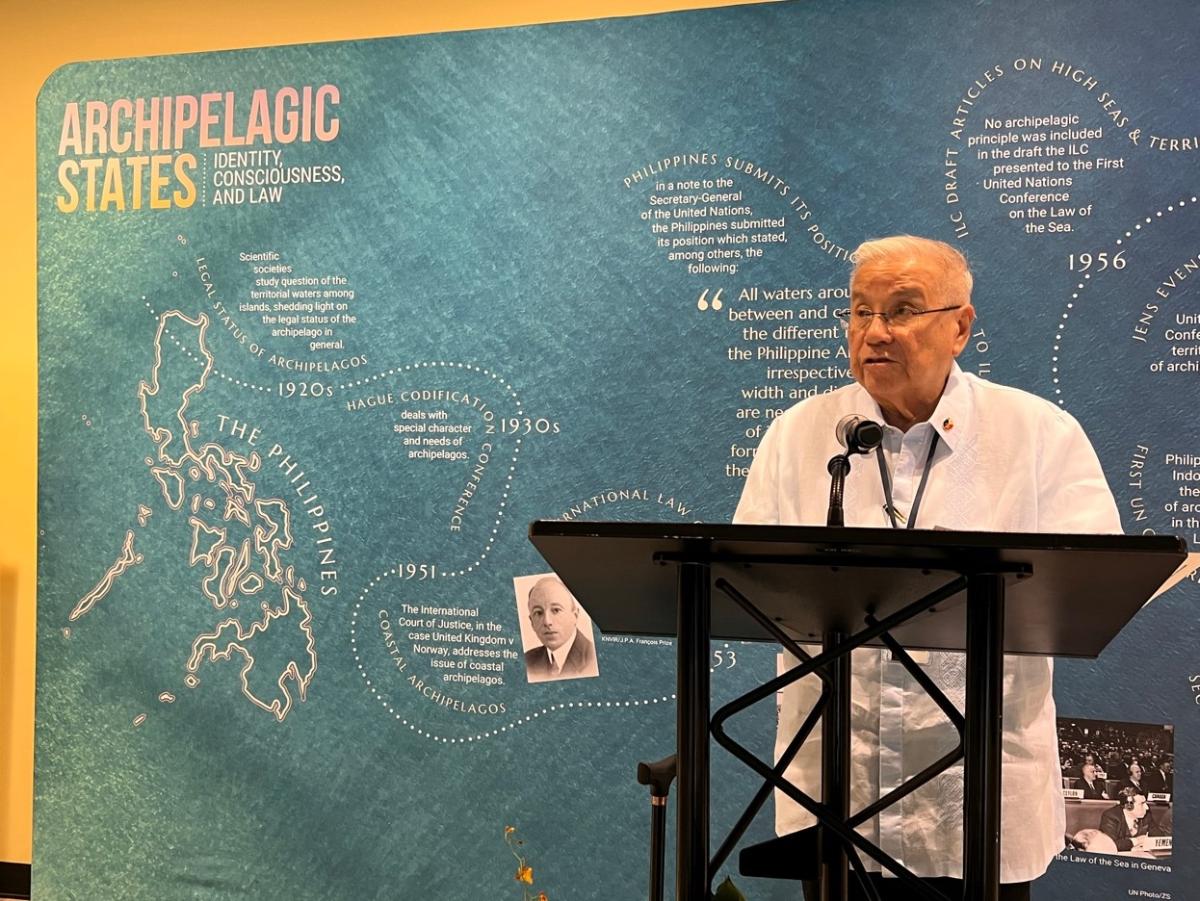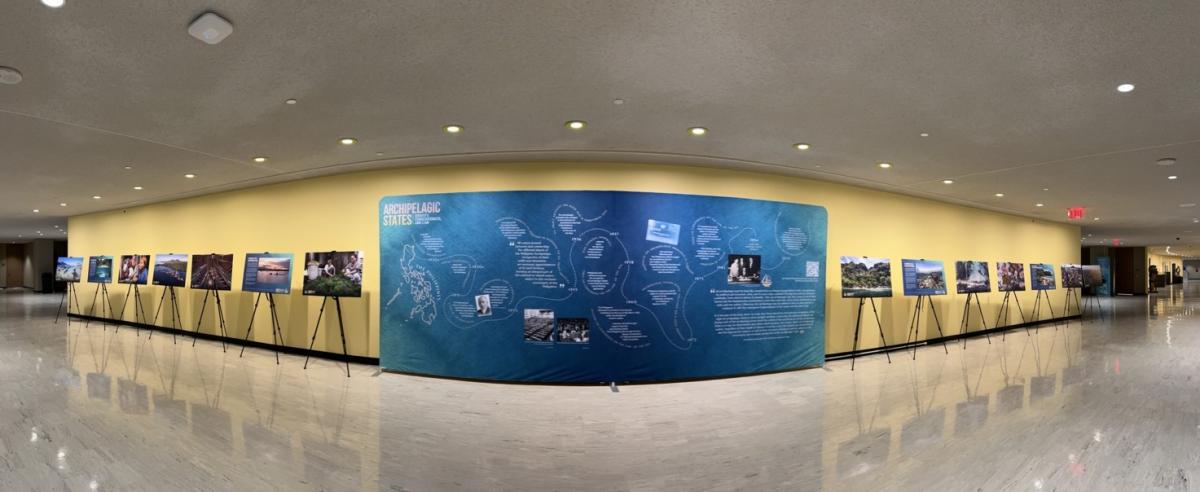
Undersecretary Carlos D. Sorreta (left) delivers the keynote remarks at the opening reception of the exhibit “Archipelagic States: Identity, Consciousness and Law” on 14 June 2023, at the UN Headquarters. Mr. Vladimir Jares (top right), Director of the UN Division of the Oceans and the Law of the Sea, attended the reception on behalf of his office. Assistant Secretary Maria Angela A. Ponce, (top bottom) delivers the closing remarks of the reception. (Photo Credit: New York PM)
UNITED NATIONS, NEW YORK, 14 June 2023 – The Permanent Mission of the Republic of the Philippines to the United Nations (UN) spearheaded an exhibit to highlight the archipelagic state regime under the 1982 United Nations Convention on the Law of the Sea (UNCLOS) on 14 June 2023 at the UN Headquarters in New York. Entitled “Archipelagic States: Identity, Consciousness and Law”, the exhibit is on display at the United Nations at the sidelines of the 33rd Meeting of States Parties to UNCLOS.
At the reception to open the exhibit, Ambassador and Permanent Representative Antonio M. Lagdameo introduced the exhibit as a brief journey into the Philippine archipelago, highlighting the Philippine islands’ intrinsic cultural, social, political and territorial unity. He also extended an invitation to revisit the archipelagic state regime under the UNCLOS.
“Archipelagic states, while distinct in their own right, are bound to the rest of the world, including especially with small island states, and are linked to the vast oceans that surround them. We have common challenges, such as climate change, marine conservation, and sustainable development, and shared responsibility towards our common future,” Ambassador Lagdameo said.
In his keynote remarks, Undersecretary for Multilateral Affairs and International Economic Relations Carlos D. Sorreta highlighted the role of the Philippines in advancing the archipelagic doctrine at the Third Conference on the Law of the Sea, which led to UNCLOS.
“The inclusion of the regime of archipelagic states in the United Nations Convention of the Law of the Sea is an important milestone in the global efforts towards a comprehensive and more equitable framework for governing the world’s oceans. It is a comprehensive regime that reflects the interests of archipelagic states and other stakeholders, including maritime nations,” he said.
Undersecretary Sorreta noted the Philippines continued to advocate for the inclusion of archipelagic states as a distinct category during the negotiations on an internationally legally binding instrument on marine biodiversity in areas beyond national jurisdiction under UNCLOS (BBNJ Agreement).
“Our unique geography makes us entirely dependent on the sea and our ecosystems affected by changes in the larger ocean ecology. We therefore look forward to the adoption of the BBNJ Agreement in the next days,” he shared.
Mr. Vladimir Jares, Director of the United Nations Office of Legal Affairs Division of Oceans and Law of the Sea (DOALOS) also attended the ceremony and delivered remarks on behalf of his office.
Ms. Maria Angela A. Ponce, Assistant Secretary for Maritime and Ocean Affairs, also shared that the exhibit links to an online exhibit of her Maritime and Ocean Affairs Office through a QR code on the panel. She continued that like the exhibit, the idea of linking, synergies, connectedness is at the heart of the archipelagic doctrine.
“It was conceived as part of national efforts to enhance public understanding of our identity as a maritime nation and an archipelagic state, and our advocacy for rule of law in the oceans,” she shared on the online exhibit, noting that it was part of the celebration of the Maritime and Archipelagic Nation Awareness Month under the subtheme, “Philippines as an Archipelagic State: UNCLOS@40”, in line with the commemoration of the 40th Anniversary of UNCLOS in 2022.
The exhibit at the UN, on the other hand, is composed of a 20-foot panel display and 14 photo panels. The display focuses on the evolution of the archipelagic state regime and highlights the Philippines' contributions in advancing it. The panels showcase images portraying the archipelago as a way of life for Filipinos, emphasizing the interconnected communities, ecosystems, and shared challenges of an archipelagic state. The display is a graphic design creation of Foreign Service Office Mr. Marthy Angue, while the photos are from documentary photographer, Mr. Jacob Maentz.
The exhibit was made possible through the support of Office of the Undersecretary for Multilateral Affairs and International Economic Relations, the Maritime and Ocean Affairs Office and the Office of Public and Cultural Diplomacy of the Department of Foreign Affairs of the Philippines. END

Ambassador and Permanent Representative Antonio M. Lagdameo welcomes guests to the reception to open the exhibit “Archipelagic States: Identity, Consciousness and Law,” on 14 June 2023 at the UN Headquarters in New York. He introduced the exhibit as a brief journey into the Philippine archipelago and an invitation to revisit the arhipeagic state regime under the 1982 United Nations Convention on the Law of the Sea. (Photo Credit: NYPM)

The exhibit “Archipelagic States: Identity, Consciousness and Law,” is composed of of a 20-foot panel display and 14 photo panels. The display focuses on the evolution of the archipelagic state regime and highlights the Philippines' contributions in advancing it. The panels showcase images portraying the archipelago as a way of life for Filipinos, emphasizing the interconnected communities, ecosystems, and shared challenges of an archipelagic state. (Photo Credit: NYPM)


